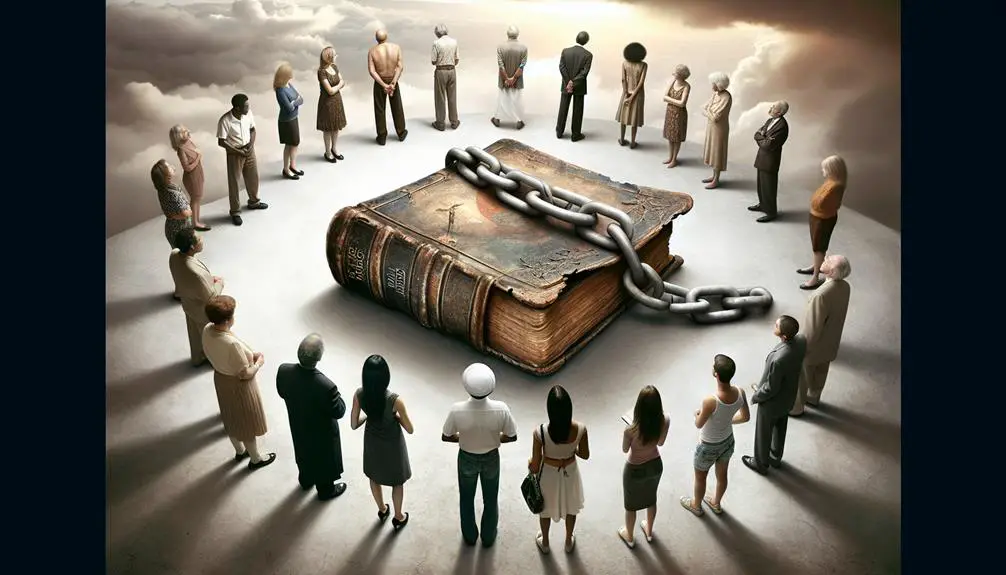Meet the mosaic of reasons behind non-belief in the Bible, where science, culture, and personal journeys challenge the traditional narrative.

Non Believers in the Bible
Like a ship navigating through uncharted waters, you might find the journey into understanding non-believers in the Bible both intriguing and complex.
You've perhaps noticed how historical skepticism, scientific perspectives, and cultural influences weave together, creating a tapestry of reasons why some individuals distance themselves from biblical narratives.
Yet, it's not just about external factors; personal experiences and ethical considerations play a significant role too.
As you explore this topic further, consider how alternative spiritualities and the role of education shape one's stance on biblical belief.
It's a conversation that opens up more questions than it answers, inviting you to consider perspectives beyond the surface.
Key Takeaways
- Non-belief in the Bible is influenced by personal experiences and cultural contexts.
- Skepticism is fueled by philosophical doubts and historical inconsistencies in biblical narratives.
- Scientific evidence, particularly from evolution, challenges traditional biblical interpretations.
- Archaeological discoveries and cultural influences contribute to reevaluating beliefs and ethical perspectives.
Understanding Non-Belief

Often, non-belief in the Bible stems from a complex interplay of personal, cultural, and intellectual factors that challenge traditional religious convictions. You'll find that psychological factors play a significant role in shaping one's stance towards religious texts. For instance, personal experiences, particularly those involving trauma or disillusionment with religious institutions, can lead to skepticism or outright rejection of biblical narratives. This skepticism isn't merely a spontaneous reaction; it's often a result of deep introspection and questioning of the moral and ethical guidelines presented within religious doctrines.
Furthermore, social dynamics can't be overlooked when analyzing non-belief. The influence of one's community, family, and peer group profoundly impacts individual perspectives on religion. In societies where secularism or alternative spiritual beliefs are prevalent, you're more likely to encounter skepticism towards the Bible. Conversely, in communities where religious adherence is the norm, deviation from belief systems can lead to social ostracization, thus reinforcing the individual's non-belief through a sense of alienation from the community.
In essence, understanding non-belief in the Bible requires a nuanced examination of the psychological underpinnings and social dynamics that drive individuals away from traditional religious convictions.
Historical Skepticism
While exploring the reasons behind non-belief in the Bible, it's critical to also consider the impact of historical skepticism. This skepticism often stems from philosophical doubts and parallels drawn with mythology, which challenge the historical accuracy of biblical narratives. You might find it surprising how these elements contribute to a skeptical view of the Bible's historical claims.
Factor |
Description |
Impact on Belief |
|---|---|---|
Philosophical Doubts |
Questions about the existence of God and the nature of reality. |
Increases skepticism |
Mythology Parallels |
Similarities between biblical stories and ancient myths. |
Questions originality |
Historical Inconsistencies |
Discrepancies within the Bible and between the Bible and historical records. |
Fuels doubt |
Archaeological Evidence |
Lack of concrete evidence for some biblical events. |
Strengthens skepticism |
The examination of these factors is not about undermining faith but about understanding the basis for skepticism. Philosophical doubts raise questions about the very foundation of religious beliefs, while parallels with mythology suggest that biblical stories might not be as unique as believed. Historical inconsistencies and the absence of supporting archaeological evidence further compound these doubts, making historical skepticism a significant reason for non-belief in the Bible.
Scientific Perspectives

You'll find that the juxtaposition of evolution and creation narratives offers a significant insight into the ongoing debate between science and religion. Archaeological evidence and its interpretation further challenge traditional biblical accounts, prompting a reevaluation of historical contexts.
Lastly, cosmology, particularly the Big Bang Theory, presents a universe origin model that starkly contrasts with creationist viewpoints, urging a critical examination of both perspectives.
Evolution Vs. Creation Narratives
The debate between evolution and creation narratives presents a pivotal discourse in understanding the origins of life from a scientific perspective. You'll find that the scientific community heavily leans towards evolution, supported by:
- Fossil debates that showcase transitional forms, bridging gaps between species.
- Genetic evidence revealing common ancestries among diverse life forms.
- Comparative anatomy highlighting homologous structures across species.
- Molecular biology tracing back the evolutionary tree through DNA.
- Evolutionary psychology explaining behavioral traits through natural selection and adaptation.
This analysis doesn't denounce creation narratives but places them in a realm separate from empirical scientific inquiry. It's essential to approach this discourse with an open mind, recognizing the role of scientific evidence in shaping our understanding of life's origins.
Archaeological Evidence and Interpretation
Examining archaeological evidence, researchers often uncover artifacts and structures that offer crucial insights into historical human beliefs and practices, including those related to biblical narratives. Pottery dating, in particular, serves as a tangible link to past societies, providing a chronological framework that can either support or challenge textual accounts found in religious manuscripts. However, textual discrepancies between archaeological findings and scriptural narratives often emerge, sparking debates over historical accuracy and interpretation.
Artifact Type |
Implication |
Emotion Evoked |
|---|---|---|
Pottery Shards |
Chronological Context |
Curiosity |
Inscriptions |
Historical Discrepancies |
Doubt |
Architectural Remains |
Societal Practices |
Wonder |
These discoveries compel you to reconsider the narratives you've inherited, pushing the boundaries of understanding and belief.
Cosmology: Big Bang Theory
In exploring the scientific perspectives on cosmology, it's crucial to understand that the Big Bang Theory posits our universe began from an extremely hot and dense point approximately 13.8 billion years ago. This theory provides a comprehensive explanation for the observable expansion of the universe, the cosmic microwave background radiation, and the distribution of galaxies.
- Quantum fluctuations played a pivotal role in the formation of the early universe, seeding the cosmic structures we observe today.
- Dark matter, an elusive substance, constitutes a significant portion of the universe's total mass, influencing the gravitational pull and the formation of galaxies.
- The cosmic microwave background radiation offers a snapshot of the universe shortly after the Big Bang.
- Galaxies' distribution and movement further support the Big Bang model.
- Ongoing research aims to unravel the mysteries of dark energy and its impact on cosmic acceleration.
The Role of Education
Understanding the role of education is critical when exploring why some individuals don't believe in the Bible. Educational policies and learning methodologies shape how individuals perceive the world, including religious beliefs. Modern education systems emphasize critical thinking and evidence-based understanding, which can lead individuals to question the literal interpretations of religious texts, including the Bible.
Educational content exposes students to a variety of perspectives, including scientific explanations for phenomena traditionally attributed to divine actions. This exposure can lead to a reevaluation of personal beliefs in light of new information. Moreover, the emphasis on critical thinking skills allows individuals to analyze and critique various sources of information, including religious texts.
Learning methodologies that encourage questioning and open discussion also play a significant role. In environments where questioning is encouraged, students learn to seek evidence and form their own opinions, which may diverge from religious teachings. This analytical approach to learning can lead to a more nuanced understanding of the Bible, viewing it as a historical or metaphorical text rather than a literal account of events.
Cultural Influences
Cultural influences significantly shape individuals' perceptions and beliefs about the Bible, often determining their acceptance or skepticism towards its teachings. The environment you're immersed in, the prevalent cultural norms, and the collective attitudes of your community all play pivotal roles in molding your views on religious texts, including the Bible.
Here are five key aspects through which cultural influences manifest:
- Artistic expressions: Art, literature, and music reflecting biblical themes can either reinforce or challenge traditional interpretations, impacting your perception.
- Social media influence: Platforms like Twitter, Instagram, and Facebook serve as modern-day forums for debate and discussion, often shaping or swaying public opinion on biblical narratives.
- Educational systems: The extent and manner in which religious education is integrated into school curriculums significantly influence societal attitudes towards the Bible.
- Historical interpretations: How history portrays biblical events and figures can affect your acceptance or questioning of its accounts.
- Celebrity endorsements or criticisms: Public figures often have a substantial impact on how the Bible is perceived, especially among younger audiences.
These cultural factors collectively contribute to shaping your stance towards the Bible, highlighting the complex interplay between societal trends and individual beliefs.
Personal Experiences

While cultural influences undeniably shape one's perspective on the Bible, personal experiences often serve as the pivotal factor in determining an individual's belief or skepticism towards its teachings. These experiences, ranging from life changes to community reactions, deeply influence one's stance.
Factor |
Influence on Belief |
Common Reactions |
|---|---|---|
Life Changes |
High |
Reevaluation |
Community Support |
Moderate |
Strengthening |
Community Opposition |
Moderate |
Doubt |
Personal Trauma |
High |
Disassociation |
Personal Success |
Low |
Confirmation |
You'll find that life changes, such as major losses or gains, often prompt a reevaluation of previously held beliefs. The reaction of one's community to these changes can either strengthen belief through support or sow seeds of doubt through opposition. Personal traumas might lead to a disassociation from earlier beliefs, viewing them as incompatible with one's experiences. Conversely, personal successes might not significantly alter one's stance but could serve to confirm existing beliefs. Analyzing these dimensions allows us to understand the complex interplay between personal experiences and belief systems, illustrating how deeply individual journeys are entwined with one's faith or skepticism towards biblical teachings.
Ethical and Moral Views
You might wonder how non-believers in the Bible navigate ethical and moral dilemmas without religious scriptures as a guide.
They often rely on secular perspectives such as ethical frameworks without religion, morality beyond divine command, and principles of secular humanism.
These approaches emphasize reason, empathy, and the welfare of humanity, offering a robust foundation for ethical decision-making.
Ethical Frameworks Without Religion
Many individuals derive their ethical and moral frameworks independently of religious doctrines, exploring secular approaches to understanding right and wrong. Philosophical existentialism empowers you to find meaning and moral direction in a universe without preordained values, emphasizing personal responsibility and authenticity.
Virtue ethics, another secular framework, focuses on character development and the virtues that constitute a good life, rather than adherence to a set of rules.
- Philosophical existentialism values personal choice and responsibility.
- Virtue ethics prioritizes character and virtues over rules.
- Secular humanism advocates for morality based on human well-being.
- Utilitarianism evaluates actions based on their consequences for overall happiness.
- Deontological ethics follows ethical principles and duties, not outcomes.
These frameworks provide robust, nuanced approaches to ethics without relying on religious texts or divine command.
Morality Beyond Divine Command
Exploring beyond religious doctrines, it's essential to examine how ethical and moral views can exist independently through the concept of morality beyond divine command. Ethical naturalism proposes that moral truths are knowable through observation and rational argument, not divine revelation. This perspective suggests that human beings, through their capacity for empathy and reason, can discern right from wrong based on the natural consequences of actions on human well-being.
Similarly, the concept of a social contract emphasizes mutual respect and cooperation among individuals as a foundational pillar for societal ethics. This approach argues that moral standards emerge from the agreements people make to ensure a harmonious and functional society. Both ethical naturalism and the social contract illustrate that morality doesn't solely hinge on divine command but can be grounded in human nature and social necessity.
Secular Humanism Principles
Secular humanism, a comprehensive life stance, posits that ethical and moral principles can be established through human reason and empathy, independent of religious doctrine. You'll find that this worldview emphasizes ethical autonomy and critical thinking, encouraging individuals to form moral judgments based upon reason and compassion rather than uncritically accepting traditional religious norms.
- Ethical autonomy fosters personal responsibility for moral decisions.
- Critical thinking is crucial for evaluating ethical dilemmas.
- Empathy guides the understanding of others' experiences and needs.
- Human reason is used to resolve moral questions and conflicts.
- Secular humanism champions equality and justice for all individuals.
These principles reflect a commitment to developing ethical systems that are both rational and sensitive to the human condition, devoid of supernatural considerations.
Alternative Spiritualities
Individuals seeking spiritual fulfillment outside traditional religious frameworks often turn to alternative spiritualities for answers. These paths offer diverse ways to explore mystical experiences and spiritual practices, providing a personal journey that resonates with one's inner self. You might find that these avenues allow for a more individualized connection to the divine or the universe, which traditional religions may not offer.
Approach |
Focus |
Benefits |
|---|---|---|
Paganism |
Nature, cycles |
Connection to Earth, seasonal awareness |
New Age |
Consciousness, energy |
Personal growth, healing |
Eastern Philosophies |
Balance, enlightenment |
Mindfulness, peace |
Shamanism |
Spirits, healing |
Deep healing, community ties |
This table highlights just a few alternative spiritual paths, each with its unique focus and set of benefits. For instance, Paganism emphasizes a deep connection with nature and its cycles, offering a grounding and cyclical perspective on life. New Age spirituality, with its focus on consciousness and energy, encourages personal growth and healing. Eastern philosophies like Buddhism and Taoism emphasize balance, mindfulness, and the pursuit of enlightenment. Shamanism, with its roots in ancient practices, focuses on healing through spiritual realms and building community ties.
Exploring these alternative spiritualities can lead to profound personal development and a deeper understanding of the world. Through engaging in these practices, you're not just learning new beliefs but also participating in a long tradition of seeking knowledge and understanding beyond the physical realm.
Frequently Asked Questions
How Do Non-Believers in the Bible Navigate Relationships With Devoutly Religious Family Members or Friends, Especially During Religious Holidays or Ceremonies?
When navigating relationships with devoutly religious family or friends, especially during holidays or ceremonies, you'll find holiday compromises and ceremonial respect crucial.
You'll need to balance your own beliefs while showing respect for theirs. This involves open communication, setting boundaries, and sometimes participating in traditions not for the religious aspect, but to honor the relationship.
It's about finding a middle ground where both parties feel respected and valued.
What Are Some Common Misconceptions or Stereotypes About Non-Believers in the Bible That They Wish to Clarify or Debunk?
You might think that without religious beliefs, you'd lack ethical foundations or a moral compass. However, many base their values on empathy, societal well-being, and reasoned argument, not just faith.
There's a misconception that you're closed-minded if you question religious narratives. In reality, your scientific skepticism drives a quest for truth through evidence and reason, not a refusal to understand or respect religious perspectives. It's about seeking understanding, not dismissal.
How Do Non-Believers in the Bible Find Community or Support, Especially in Regions Where Religious Belief Is the Norm?
You might wonder how individuals find community or support in areas where religion dominates. Many turn to online forums and secular meetups to connect with like-minded people. These platforms offer a space to share experiences, seek advice, and find solidarity.
Through these avenues, you can engage in discussions, participate in events, and even contribute to community projects. This approach provides a sense of belonging and support outside traditional religious settings.
In What Ways Do Non-Believers in the Bible Contribute to Interfaith Dialogues or Religious Discussions, and What Perspectives Do They Bring to These Conversations?
You bring unique perspectives to interfaith dialogues, highlighting secular morality and cultural understanding. Your contributions enrich discussions by offering views not rooted in religious doctrine, which can bridge gaps between diverse beliefs.
How Do Non-Believers in the Bible Approach Teaching About Religion and Religious Texts to Their Children or in Educational Settings Where They Have Influence?
When you're teaching about religion, you walk a delicate path. Imagine balancing on a tightrope of educational neutrality, ensuring each step is taken with care.
You aim to foster cultural literacy, presenting religious texts as windows into diverse beliefs and histories. Your approach is analytical, dissecting these texts with an objective lens, encouraging students to appreciate their cultural significance without endorsing any singular perspective.
This method enriches understanding while respecting diverse viewpoints.
Conclusion
As you've journeyed through the tapestry of reasons behind non-belief in the Bible, from the seeds of historical skepticism to the rich soil of cultural influences, it's clear that understanding isn't monochromatic. Like a kaleidoscope, personal experiences, ethical views, and alternative spiritualities add layers of complexity.
This exploration isn't just academic—it's a mirror reflecting the diverse landscape of human thought and belief. So, let's embrace this diversity with open minds, recognizing that understanding others' perspectives enriches our own.



Sign up